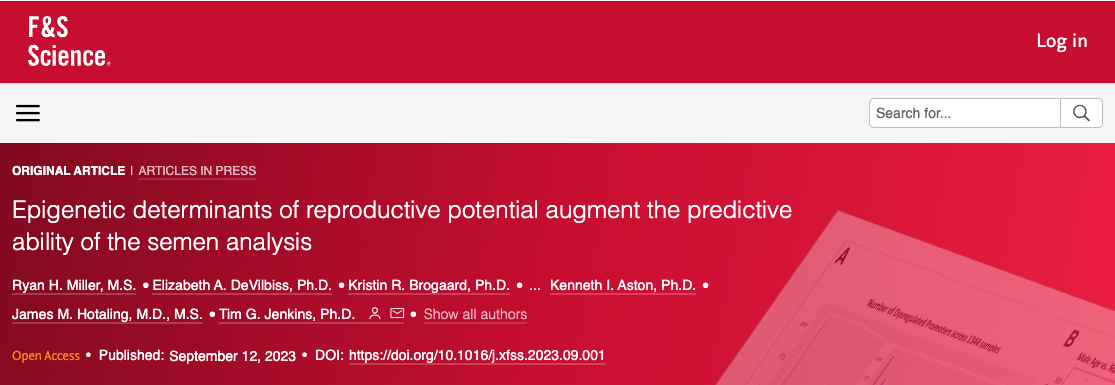Unveiling the Power of Epigenetics in Male Fertility: A New Horizon Beyond Semen Analysis
Introduction
The journey of understanding male fertility has been long and winding. For years, the primary tool for assessing male fertility has been the semen analysis, which evaluates sperm quantity, shape, and motility. However, recent research has unveiled the potential of epigenetics, specifically DNA methylation, in predicting male fertility outcomes. Let's delve into the groundbreaking findings from a recent study conducted at our company in collaboration with esteemed researchers from the NIH, University of Utah and Brigham Young University.
The Study at a Glance
Objective: To explore the role of DNA methylation variability in sperm cells in predicting male fertility potential
Design: Retrospective cohort
Setting: Fertility care centers
Participants: Male patients seeking infertility treatment and fertile male sperm donors
Key Findings
DNA Methylation as a Biomarker: Variability in methylation at gene promoters enhances the predictive ability of traditional semen analysis. This could serve as a reliable biomarker for predicting outcomes of intrauterine insemination (IUI).
IVF Overcomes Epigenetic Instability: In vitro fertilization, especially with intracytoplasmic sperm injection (ICSI), seems to bypass the challenges posed by high levels of epigenetic instability in sperm.
Why is this Important?
Despite advancements in understanding the multifaceted relationships among various sperm components, male infertility is still primarily assessed through basic semen analysis. This method, although valuable, has its limitations. The introduction of DNA fragmentation testing added another layer to our understanding, but its correlation with fertility potential remains debated.
The study's findings suggest that assessing epigenetic markers, specifically DNA methylation, could provide a more comprehensive picture of male fertility potential. This could revolutionize the way we approach male infertility, offering a more nuanced and accurate assessment.
The Epigenetic Sperm Quality Test (SpermQT)
Drawing from extensive data, the study introduced the Epigenetic Sperm Quality Test (SpermQT). This test, when combined with traditional semen analysis, broadens the clinical assessment of male fertility potential. SpermQT evaluates the epigenetic stability of sperm, providing insights into the underlying health and potential fertility of the sperm.
Implications for the Future
A Comprehensive Diagnostic Tool: Combining the SpermQT with traditional semen analysis offers a more holistic view of male fertility, potentially identifying men previously undiagnosed as subfertile.
Guided Treatment Recommendations: With a clearer understanding of male fertility, clinicians can provide more accurate treatment recommendations, potentially saving patients time and resources.
Potential for Therapeutics: Understanding the mechanisms identified by this potential biomarker could pave the way for developing future infertility treatments.
Conclusion
The exploration of epigenetics in the realm of male fertility has opened up new horizons. As we continue to delve deeper into the intricate dance of genes, environment, and fertility, we move closer to offering more comprehensive care and guidance for those embarking on the journey of parenthood. The future of male fertility assessment looks promising, with tools like the SpermQT leading the way.
For a detailed look into the study, its methodology, and findings, please see the original publication.

